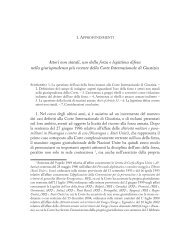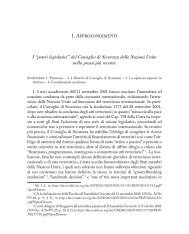Objective Territorial Principle or Effects Doctrine? Jurisdiction and ...
Objective Territorial Principle or Effects Doctrine? Jurisdiction and ...
Objective Territorial Principle or Effects Doctrine? Jurisdiction and ...
You also want an ePaper? Increase the reach of your titles
YUMPU automatically turns print PDFs into web optimized ePapers that Google loves.
In.Law | 6 (2006) | 285<br />
This article examines how the principles of jurisdiction function in cases<br />
in courts involving internet. The concrete question to be dealt with is twofold.<br />
First, do the courts in cases involving internet use the established principles of<br />
jurisdiction, <strong>or</strong> do they deviate from these principles <strong>and</strong> apply new logic <strong>and</strong><br />
reasoning to internet cases? The observation of this article is that the courts<br />
indeed use the established principles of jurisdiction rather than inventing new<br />
rules specifically f<strong>or</strong> internet cases. Second, given this observation, is there any<br />
novelty in the principles of jurisdiction in internet cases? A thesis of this article is<br />
that although the principles of jurisdiction appear to be unaffected by cyberspace,<br />
the way they function in internet cases is not identical to the way they functioned<br />
in previous cases. The title of the present article is a teaser of this thesis.<br />
The question of jurisdiction over online acts can arise both in a criminal<br />
context <strong>and</strong> in a civil context. As the brief introduction above suggests, this article<br />
deals with issues of public international law, i.e., criminal jurisdiction 3 as opposed<br />
to civil jurisdiction. In studies of jurisdiction in public international law, the<br />
subject is further divided into either two categ<strong>or</strong>ies (prescriptive <strong>and</strong> enf<strong>or</strong>cement<br />
jurisdiction) 4 <strong>or</strong> three categ<strong>or</strong>ies (prescriptive/legislative, judicial/adjudicative <strong>and</strong><br />
executive/enf<strong>or</strong>cement jurisdiction). 5 This article adopts the f<strong>or</strong>mer approach<br />
since the division into three categ<strong>or</strong>ies is not necessary f<strong>or</strong> the purpose of this<br />
article. When law is applied to a specific case by a court, it is considered as a<br />
concrete manifestation of prescriptive jurisdiction. Unless specifically named<br />
otherwise, jurisdiction in this article means prescriptive jurisdiction in this<br />
sense. It is prescriptive jurisdiction that has always raised imp<strong>or</strong>tant the<strong>or</strong>etical<br />
challenges especially with regard to its extraterrit<strong>or</strong>ial reach, 6 <strong>and</strong> it continues to<br />
do so in the internet context.<br />
3 “Criminal jurisdiction” in this context refers not only to jurisdiction over criminal matters<br />
in a narrow sense. It refers to jurisdiction over all matters related to coercive measures by the state<br />
auth<strong>or</strong>ities that are implemented to secure compliance with the law. Douglas E. Rosenthal & William<br />
M. Knighton, National Laws <strong>and</strong> International Commerce: Problem of Extraterrit<strong>or</strong>iality, (1982),<br />
p. x. 4 Vaughan Lowe, <strong>Jurisdiction</strong>, in International Law 329, (Malcolm D. Evans ed. 2003), pp.<br />
332-33; Pierre-Marie Dupuy, Droit international public (8th ed. 2006), pp. 82-83.<br />
5 Michael Akehurst, <strong>Jurisdiction</strong> in International Law, 46 Brit. Y.B. Int’l L. (1972-73), pp. 145-<br />
212; Antonio Cassese, International Law (2nd ed. 2004), pp. 49-51.<br />
6 As to the enf<strong>or</strong>cement jurisdiction, there is a wide agreement that it has to be strictly territ<strong>or</strong>ial,<br />
in the sense that it cannot be exercised in the territ<strong>or</strong>y of another State without consent of<br />
that State.

















